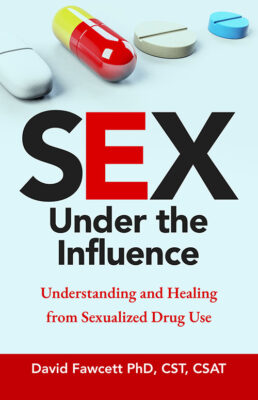The Frequency and Manifestations of Sexualized Drug Use
 Dr. David Fawcett
Dr. David Fawcett
Historically, most addicts developed a problem with a single substance, such as alcohol, or a single behavior, such as gambling. More recently, however, and probably for longer than we have realized, multiple addictive substances and behaviors are present at the same time such as compulsive eating, smoking cigarettes, shopping, and sex/porn addiction, to name but a few.
Whether standalone, such as a singular interest in alcohol, or co-occurring with multiple substances and/or behaviors, addictions are more common than most people believe. One meta-analysis reviewed the prevalence of singular addictions, including behaviors such as internet addiction and sex/porn addiction.[i] That analysis looked at 83 studies with sample sizes of at least 500 subjects. The results showed that addictions to eating, gambling, the Internet, love, sex/porn, and exercise have a prevalence rate of  about 2–3 percent of the population. Addictions to alcohol (10 percent prevalence), nicotine (15 percent prevalence), illicit drugs (5 percent prevalence), work (10 percent prevalence), and shopping (6 percent prevalence) have a higher occurrence. The study also revealed the prevalence of co-occurring behaviors. For example, although illicit drug use was estimated at 5 percent of the overall population, it was closer to 40 percent among sex and love addicts.
about 2–3 percent of the population. Addictions to alcohol (10 percent prevalence), nicotine (15 percent prevalence), illicit drugs (5 percent prevalence), work (10 percent prevalence), and shopping (6 percent prevalence) have a higher occurrence. The study also revealed the prevalence of co-occurring behaviors. For example, although illicit drug use was estimated at 5 percent of the overall population, it was closer to 40 percent among sex and love addicts.
Studies into forms of co-occurring addictive patterns provide more in-depth insight. Patrick Carnes and colleagues have identified this as Addiction Interaction Disorder,[ii] noting that co-occurring addictions are increasingly common. For example, Canadian researchers surveyed 6,000 respondents and evaluated the usage of drugs such as alcohol, tobacco, marijuana, and cocaine in conjunction with six behaviors: gambling, eating, shopping, sex, video gaming, and work.[iii] About 30 percent of respondents reported one substance or behavior as problematic within the past year; 13 percent reported two problems; and 8 percent reported problems with three or more substances or behaviors. The study found that individuals who identified a problem with sex in the past year also identified problems with:
- Alcohol, 13 percent
- Shopping/Spending, 15 percent
- Nicotine, 22 percent
- Food/Eating, 35 percent
- Work, 38 percent
Another study found that substance abuse (all types) co-occurred with sexual behavior issues at rates between 39 percent and 42 percent.[iv] Work addiction, compulsive eating, shopping, gambling, and exercise were also found to frequently co-occur with sex addiction, with rates ranging from 8 percent to 38 percent.
* * * * * * * * * *
If you or a loved one are struggling with sex, porn, or substance/sex addiction, Seeking Integrity can help. In addition to residential rehab, we offer low-cost online workgroups for male sex addicts and male porn addicts new to recovery. Click HERE for information on our Sex Addiction Workgroup. Click HERE for information on our Porn Addiction workgroup.
References
[i] Sussman, S., Lisha, N., & Griffiths, M. (2011). Prevalence of the addictions: a problem of the majority or the minority?. Evaluation & the health professions, 34(1), 3-56.
[ii] Carnes, P. J., Murray, R. E., & Charpentier, L. (2004). Addiction interaction disorder. Handbook of addictive disorders: A practical guide to diagnosis and treatment, 31-59.
[iii] Konkolÿ Thege, B., Hodgins, D. C., & Wild, T. C. (2016). Co-occurring substance-related and behavioral addiction problems: A person-centered, lay epidemiology approach. Journal of Behavioral Addictions, 5(4), 614-622.
[iv] Freimuth, M., Waddell, M., Stannard, J., Kelley, S., Kipper, A., Richardson, A., & Szuromi, I. (2008). Expanding the scope of dual diagnosis and co-addictions: Behavioral addictions. Journal of Groups in Addiction & Recovery, 3(3-4), 137-160.
